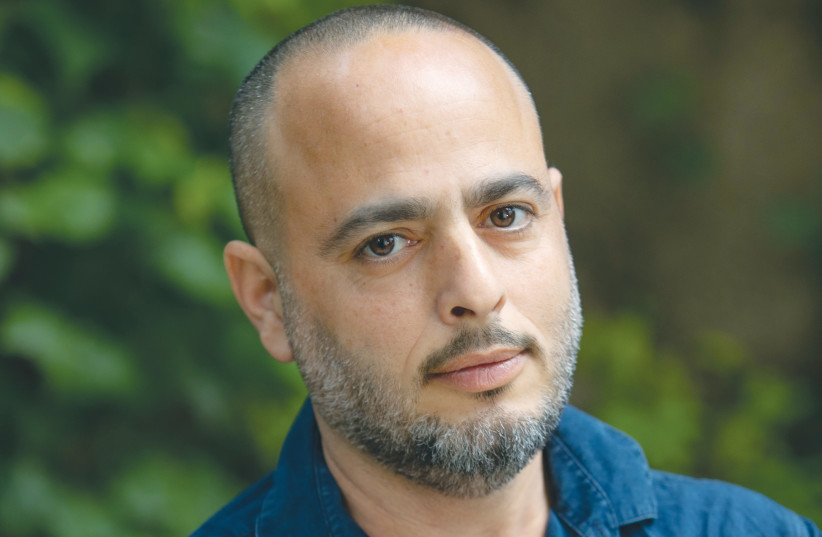“Nothing is harder – or more fun – to make than a comedy,” observed Ariel Benbaji. He should know, since his new movie, The Hilula (HaHilula), which he co-directed with its star, Shalom Assayag, will be premiering in Israel on July 13.
The movie, which stars the cast and characters of the popular TV series The ’90s, opens when Israelis were just putting away their gas masks after the Scud missiles of the First Gulf War.
It looks back at the days before cellphones and Waze, when people could get lost, and, like the characters in this story, even take a wrong turn and get kidnapped in Gaza.
What is the Israeli comedy film The Hilula about?
The characters are residents of a small northern town, Tirat Hacarmel. These characters, who include just about every stereotype and misfit – Mizrahim, haredim, fussy Russians, etc. – board a bus and a van and head for Netivot to take part in the hilula, a cult-like celebration of the life of the late Moroccan rabbi, the Babi Sali, held every year at his tomb.
It’s all because Prosper (played by Assayag), a leading figure in the town, has a dream where his grandfather reminds him of a promise that he would make the Netivot pilgrimage once the war ended.
Filled with gratitude over the fact that they no longer need their gas masks, he and his wife (Evelin Hagoel) get their friends and neighbors fired up to head south. Only the driver isn’t so great at reading maps and they end up in Gaza.

There, a group of merchants accused by terrorists of collaboration with the Israelis – although they are actually furniture salesmen – are pressured to take them hostage. And then it gets complicated.
Although to many of us, this sounds like a remote world and not just because of the period, Benbaji is sure that the wild farce has moments that will appeal to all Israelis, even English-speaking immigrants.
“Whether or not we’re laughing on the set, we have to worry about whether it’s funny or not,” said Benbaji, the rare Israeli film industry professional who lives in Jerusalem. “We have to keep everyone laughing in the theater.”
HE ESPECIALLY enjoyed collaborating with Assayag, whom he has worked with on The ’90s series for years, and on this movie, which he and the producers are hoping will be the big summer comedy.
“When I go out with him on the street, I realize what a huge star he is,” said Benbaji of Assayag, who recently starred in the police drama, Manayak. “People love him. They come up to him, they talk to him like he’s their grandfather.”
Assayag makes acting look easy, but Benbaji cautioned that to be as natural as he is on camera, particularly in comedy, takes a lot of skill. “He has the talent of an iconic comic, like Charlie Chaplin,” he said.
Whether or not audiences will catch every reference to the Baba Sali or other subjects, the director said that he feels the story will draw people in. “When humor works, there’s always a grain of truth in it and I think everyone can connect to that. These people are from Tirat Hacarmel, they’re from the periphery, they’re underdogs and people can relate to that.”
Assayag, who, like the characters, hails from Tirat Hacarmel “created these characters, he knows these people from the periphery, and he loves them,” Benbaji said. “It’s about his youth... He makes fun of them, but with affection. And he also makes fun of himself.”
The film stars a Who’s Who of Israeli actors, including Shlomi Koriat, Orel Tsabari, Arik Mishali, Moris Cohen, Ofer Shechter, and Sharlin Haziza-Morai.
In a certain way, all the actors in the movie are like standups, playing their characters from the series. “It’s like jazz. There is a certain amount of improvisation; you can’t put them in a straitjacket,” Benbaji observed.
Of course, there is a limit to how much you can diverge from the script in the 17 shooting days budgeted for the film, he admits. “Most of the time, when we changed something from the script, it turned out to be the funniest part of the scene.”
THE MOVIE proudly claims its heritage as being in the tradition of the sereti burekas, the broad comedies from the 1970s that delighted audiences at home and even occasionally traveled abroad.
In one scene, the movie directly references a scene in the Yehuda Barkan comedy, Charlie and a Half, where Barkan and Ze’ev Revach face off in an egg-eating contest. The Hilula even features one of the beloved stars of many of these vintage comedies, Zachi Noy of the Eskimo Limon movies, who plays the bus driver who takes the group to Gaza.
Although The Hilula is clearly a comedy in the burekas mode, Benbaji hopes that the story of misfits bonding on a road trip, and even finding the humanity in the kidnappers who are forced to take them hostage, may resonate with audiences today, who are reeling from political polarization.
“I wouldn’t say the movie has a message,” Benbaji cautioned. “But it can be good for everyone to laugh.”
